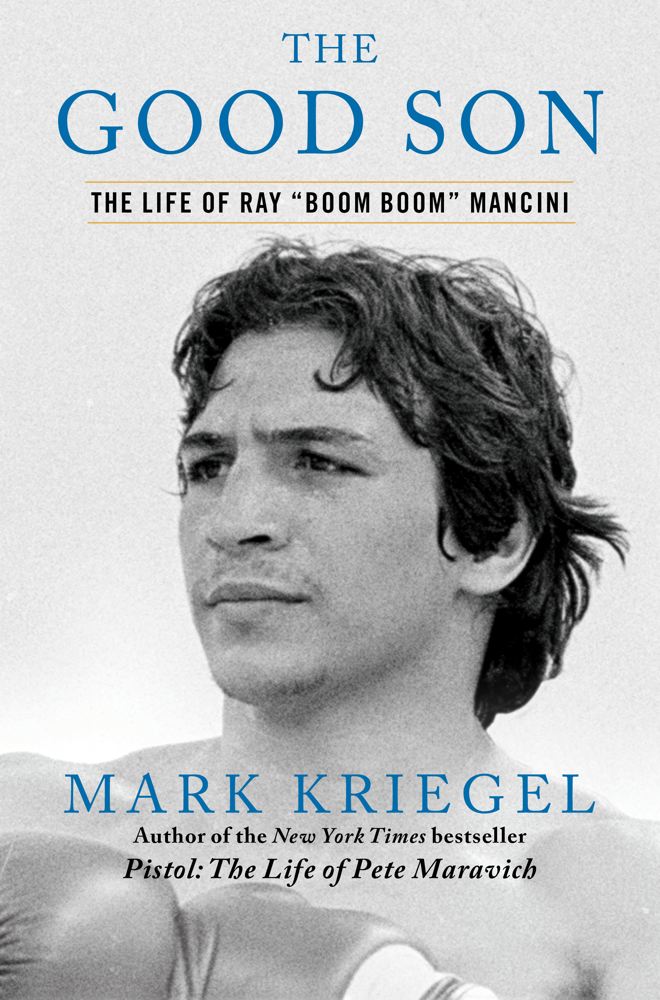Frank Sinatra fawned over him. Warren Zevon wrote a tribute song. Sylvester Stallone produced his life story as a movie of the week. In the 1980s, Ray “Boom Boom” Mancini wasn’t merely the lightweight champ. An adoring public considered him a national hero, the real Rocky.
From the mobbed-up steel city of Youngstown, Ohio, Mancini was cast as the savior of a sport: a righteous kid in a corrupt game, symbolically potent and demographically perfect, the last white ethnic. He fought for those left behind in busted-out mill towns across America. But most of all, he fought for his father. Lenny Mancini—the original Boom Boom, as he was called—had been a lightweight contender himself. But the elder Mancini’s dream ended on a battlefield in November 1944, when fragments from a German mortar shell nearly killed him. Almost four decades later, Ray promised to win the title his father could not. What came of that vow was a feel-good fable for network television.
But it all came apart November 13, 1982, in a brutal battle at Caesars Palace in Las Vegas. Mancini’s obscure Korean challenger, Duk Koo Kim, went down in the 14th round and never regained consciousness. Three months later, Kim’s despondent mother took her own life. The deaths would haunt Ray and ruin his carefully crafted image, suddenly transforming boxing’s All-American Boy into a pariah.
Now, thirty years after that nationally televised bout, Mark Kriegel finally uncovers the story’s full dimensions. In tracking the Mancini and Kim families across generations, Kriegel exacts confessions and excavates mysteries—from the killing of Mancini’s brother to the fate of Kim’s son. In scenes both brutal and tender, the narrative moves from Youngstown to New York, Vegas to Seoul, Reno to Hollywood, where the inevitably romantic idea of a fighter comes up against reality.
With the vivid style and deep reporting that have earned him renown as a biographer, Kriegel has written a fast-paced epic. The Good Son is an intimate history, a saga of fathers and fighters, loss and redemption.
John Z. says:
"I've never had quite the reading experience I had with this terrific boxing biography of Ray Mancini, who was a great fighter and kid who came up from a fighting family in Youngstown, Ohio, a Dad who was a serious "contender", a brother who headed south into drugs (one can't help but picture the movie 'The Fighter'), a larger than life mother.
Ray Mancini made all the right moves, but his life unraveled when in the aftermath of his championship fight with a very worthy fighter, Korean,Duk Koo Kim, died after their championship bout. At this point the world seemed to turn on Mancini. He basically lost his career and self, over not just the tragedy, but the transformation of his persona in the fight world from 'hero' to 'murderer', supported by a seemingly incessant barrage of public insults, including kids at school calling Ray's kid's father, 'Killer. The unraveling happened over a twenty year period, and in the last couple of years, Ray has been able to pull it together.
The unique experience for me was that while I was riveted by this book, I just had the sense that the real story was the injustice of fight fans labeling a boxer who is doing what they're paying to see him do as a killer. Without the fans themselves, there is no fight. They were complicit, in the tragedy. It seemed to me that it was an opportunity to talk about a public which thrives on pointing a finger, but seldom understands its own responsibility.
This was a great story, but I'd have written a different book. (Do I conclude with a question?). I'd love to hear from folks who have had the experience of a book they've read and liked, but wished the author told a different story."


No comments:
Post a Comment